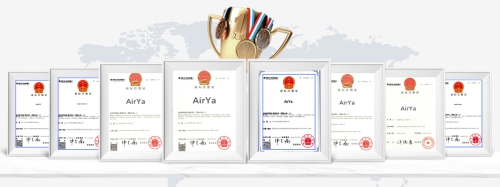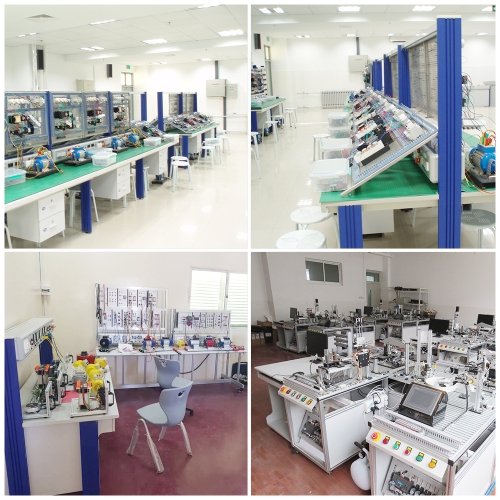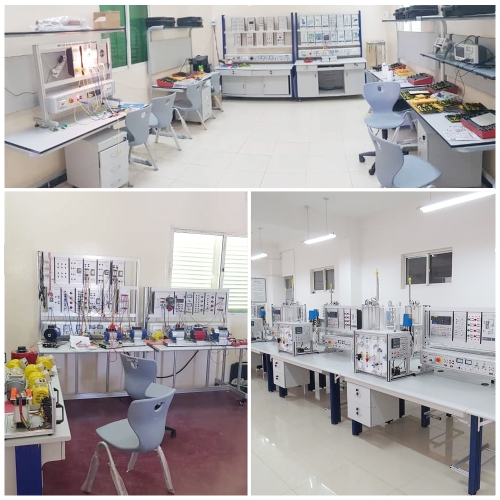whatsapp: 0086-18615575385
E-mail: admin@sdafit.com
Combine the two workbench function together, and put in on workbench
Description
The laboratory bench is designed for laboratory works to study electrical machines in universities and specialized schools.
The construction of the bench consists of a case with the following equipment installed: electrical equipment, electronic circuit boards, front panel and integrated desktop tabletop.
The following equipment is placed inside the case:
rectifier board;
load resistors module;
three-phase laboratory transformer;
three-phase transformer investigated.
Electrical schemes of the objects investigated are shown on the front panel. All the schemes shown are divided into groups in accordance with the theme of laboratory work conducted. On the front panel installed: commutation sockets, analogue panel meters, commutation equipment and controllers, which allow to change options of the elements during conduction of laboratory work.
The controllers are:
three-phase laboratory autotransformer (LAT) switcher, which allows to change voltage withing 0..20V with a 2V pitch and 130..250V with a 30V pitch;
single-phase laboratory autotransformers switchers (LATs), which allow to change voltage within 50..110V with a 10V pitch;

load resistors module switchers, witch allow to connect resistors of different resistance.
The following electrical machines are installed on the panel of the bench:
asynchronous electric motor with a squirrel-cage rotor - 1 pc.;
separately excited DC motors - 2 pc.;
tachogenerator with permanent magnets excitation;
contactless selsyns.
To carry out laboratory work it is necessary to assemble the scheme of the object investigated with a help of unified jumpers, which allow to assemble schemes without loss of their clarity.
Measurements are carried out with analogue panel meters. There are 10 panel meters installed on the front panel of the bench, among them are:
AC ammeter (measurement limit 0,2/0,5/1 A, accuracy class 2,5) 1 pc.;
DC ammeter (measurement limit 1A, accuracy class 2,5) 2 pcs.;
DC ammeter (measurement limit 0,2A, accuracy class 2,5) 1 pc.;
AC voltmeter (measurement limit 100V, accuracy class 1) 1 pc.;
DC voltmeter (measurement limit 200V, accuracy class 1) 1 pc.;
AC wattmeter (measurement limit 40/450W, accuracy class 2,5) 1 pc.;
RPM meter (measurement limit 5000 rpm, accuracy class 4) 1 pc.
The laboratory bench is supplied with the following methodical support: methodical and technical documentation set for teaching staff.
The educational laboratory stand is designed for studying design and principle of operation of three-phase transformer.
Constructively the stand consists of a body with electrical equipment, printed circuit boards, investigated transformers, a static load module, a measurement system, a frontal panel and an integrated tabletop. The measurement system is designed to display the investigated parameters (current, voltage, power).
The frontal panel of the stand contains:
static load controller;
start-up and adjusting controllers;
measurement system indicators;
switching jacks;
USB-connector for PC.
Software and methodical documentation supplemented to the stand:
methodical and technical documentation set intended for academic staff;
software for working with the stand.
The stand allows carrying out the following laboratory works:
The bench allows to carry out the following laboratory works:
1.The study of single-phase transformer.
The object studied: single-phase transformer. During the laboratory work idle, short circuit, load operation states are studied and external characteristics of the transformer are measured.
2.The study of three-phase transformer.
The object studied: three-phase transformer. During the laboratory work idle, short circuit, load operation states are studied and external characteristics of the transformer are measured.
3.The study of three-phase transformer joint groups.
The object studied: three-phase transformer. During the laboratory work the transformer primary and secondary windings voltage radio is studied when windings 0, 5, 6, 11 are jointed into groups.

4. The study of separately excited DC motor.
The object studied: separately excited DC motor, loaded DC motor in dynamic breaking mode. During the laboratory work operating and control characteristics of the motor are measured.
5.The study of separately excited DC generator.
The object studied: DC generator rotated by DC electric motor. During the laboratory work idle, external and control characteristics of the generator are measured.
6.The study of asynchronous motor with squirrel-cage rotor.
The object studied: asynchronous motor with squirrel-cage rotor loaded with DC motor in dynamic breaking mode. During the laboratory work operating and mechanical characteristics of the motor are measured.
7.The study of selsyns in indicator and transformer operation modes.
The object studied: selsyns in indicator and transformer operation modes. During the laboratory work the operation of selsyns in indicator and transformer modes is studied.
8.Investigation of one-phase transformer by no-load method.
9.Investigation of one-phase transformer by short circuit method.
10.Investigation of external characteristics of three-phase transformer when operating with various load types.
11.Experimental determination of connection groups of three-phase transformer by voltmeter method.
12.Investigation of parallel operation of three-phase transformers with equal parameter values.
13.Investigation of parallel operation of three-phase transformers with various values of transformation ratio.
14.Investigation of parallel operation of three-phase transformers with various values of short circuit voltage.
Complete set "Transformers":
laboratory stand "Transformers";
set of jumpers;
AM-BM USB 2.0-cable;
CD with accompanying documents and software.
